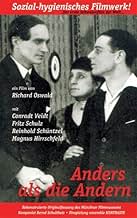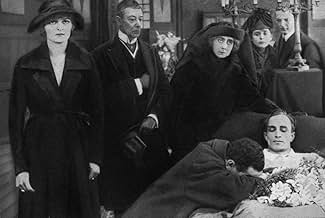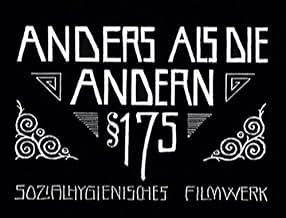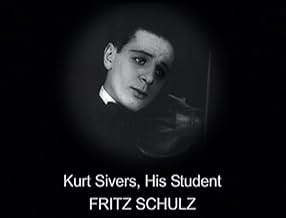NOTE IMDb
7,0/10
1,6 k
MA NOTE
Ajouter une intrigue dans votre langueTwo male musicians fall in love, but blackmail and scandal makes the affair take a tragic turn.Two male musicians fall in love, but blackmail and scandal makes the affair take a tragic turn.Two male musicians fall in love, but blackmail and scandal makes the affair take a tragic turn.
- Réalisation
- Scénario
- Casting principal
Avis à la une
It's a wonder any of this film exists; if not for the wear of age (it's said that most films of this era are lost), one would think censorship and the Nazis would have annihilated it. Yet, much of the footage remains. The Kino release of the reconstruction fills in the rest of the story with explanatory intertitles and still photographs, nearing the film's original runtime. That's the first wonder.
The second is its message of tolerance and understanding of homosexuals. Message films, social realist films, or "enlightenment films" were not too common in the silent era, probably because the lack of sound takes away from the capacity to lecture. Lois Weber is an exception that I'm familiar with; she made a career out of selling morals to audiences. "Different from the Others" includes the tact of a self-referential scene, which Weber broadened to more interesting depths in her best work. This is a film pleading for the equality of homosexuals, and it features a lecture within the lecture doing the same: the "sexoligist" Magnus Hirschfeld giving a slideshow presentation, which is attended by Else. I think it makes the film more honest, and, at the same time, it's a way for the filmmakers to be as blunt as possible.
It's difficult to appreciate the film aesthetically, anymore. The gay nightclub scenes are frank, but the film seems to shy away from too much intimacy between homosexuals. "Philadelphia" (1993) has been criticized for it's lack of a kiss, too, so I suppose it's asking too much of a film from 1919. The camera-work appears rather static, as well. On the other hand, Conrad Veidt was an admirable man and quite an actor. This is as much bravery from a prominent actor as you'll ever see. And, he was outspoken against the Nazis, as opposed to Emil Jannings, probably the other major male star of German silent film. Although Veidt's performance is much in the style of the time, he shows the right balance of effeminacy without being stereotypical.
Other than Veidt, the film isn't of much entertainment or artistic value. The film's message, however, is very important, even today; as the reconstruction introduction says, Germany, while a generally liberal government and populace today, Paragraph 175 wasn't repealed until 1994. And, there's the marriage debate in the US and elsewhere. "Different from the Others" is powerful in that way.
The second is its message of tolerance and understanding of homosexuals. Message films, social realist films, or "enlightenment films" were not too common in the silent era, probably because the lack of sound takes away from the capacity to lecture. Lois Weber is an exception that I'm familiar with; she made a career out of selling morals to audiences. "Different from the Others" includes the tact of a self-referential scene, which Weber broadened to more interesting depths in her best work. This is a film pleading for the equality of homosexuals, and it features a lecture within the lecture doing the same: the "sexoligist" Magnus Hirschfeld giving a slideshow presentation, which is attended by Else. I think it makes the film more honest, and, at the same time, it's a way for the filmmakers to be as blunt as possible.
It's difficult to appreciate the film aesthetically, anymore. The gay nightclub scenes are frank, but the film seems to shy away from too much intimacy between homosexuals. "Philadelphia" (1993) has been criticized for it's lack of a kiss, too, so I suppose it's asking too much of a film from 1919. The camera-work appears rather static, as well. On the other hand, Conrad Veidt was an admirable man and quite an actor. This is as much bravery from a prominent actor as you'll ever see. And, he was outspoken against the Nazis, as opposed to Emil Jannings, probably the other major male star of German silent film. Although Veidt's performance is much in the style of the time, he shows the right balance of effeminacy without being stereotypical.
Other than Veidt, the film isn't of much entertainment or artistic value. The film's message, however, is very important, even today; as the reconstruction introduction says, Germany, while a generally liberal government and populace today, Paragraph 175 wasn't repealed until 1994. And, there's the marriage debate in the US and elsewhere. "Different from the Others" is powerful in that way.
10Venarde
A frank story of homosexual love and tragedy made 85 years ago, featuring such amazing things as a same-sex dance hall and a drag ball as background to dramatic scenes. It still packs a wallop, thanks to its purpose as an impassioned plea for justice and a wonderful central performance by the Conrad Veidt. Kino has just released this reconstructed version of about 50 minutes, based in large part on a print discovered in Moscow, with intertitles and a few stills telling the rest. It's a an effective drama and a fascinating history lesson. A good bit is still missing, but the most amazing things turn up, so maybe more of Anders als die Andern will as well. To have this much is wonderful.
Two male musicians fall in love, but blackmail and scandal makes the affair take a tragic turn.
Director Richard Oswald was bold in making this film and pushing the message that homosexuality was not a crime but a failure of society to be accepting. Especially at the time when homosexuality was blatantly illegal in Germany. Not surprisingly, the film was soon banned and almost completely destroyed.
Conrad Veidt was also bold for starring in it, even if he had not yet been made into a star for "Cabinet of Dr. Caligari" the following year. This was at least Veidt's second time working with Oswald, having just finished up "Uncanny Stories".
The plot is interesting in making the presentation that homosexuality is normal (definitely a minority view at the time) and the real crime was extortion from those who would blackmail closeted men. Although neither Oswald nor Veidt were gay, they clearly had sympathy for their brethren (Veidt was later better known for standing up for the Jewish community).
Director Richard Oswald was bold in making this film and pushing the message that homosexuality was not a crime but a failure of society to be accepting. Especially at the time when homosexuality was blatantly illegal in Germany. Not surprisingly, the film was soon banned and almost completely destroyed.
Conrad Veidt was also bold for starring in it, even if he had not yet been made into a star for "Cabinet of Dr. Caligari" the following year. This was at least Veidt's second time working with Oswald, having just finished up "Uncanny Stories".
The plot is interesting in making the presentation that homosexuality is normal (definitely a minority view at the time) and the real crime was extortion from those who would blackmail closeted men. Although neither Oswald nor Veidt were gay, they clearly had sympathy for their brethren (Veidt was later better known for standing up for the Jewish community).
Interesting early film dealing with homosexuality and the laws in Germany at the time making it a crime punishable by a prison sentence. About a famous violin virtuoso, Paul (played by Conrad Veidt), who after a concert one evening is approached by a handsome young man named Kurt who idolizes and has a youthful crush on the older man. Kurt dreams of taking lessons from his idol, so visits the kimono-dressed man in his apartments where he is soon being given private violin lessons. The two men quickly become closer and closer, playing duets together on violin and piano, and taking strolls in the park arm and arm, but unfortunately a blackmailer sees them in the park - and seizes upon an opportunity to make himself some quick "hush money". Interestingly, the blackmailer himself hangs out in a nightclub full of women dressed as men, and pairs of men dancing together, which made me wonder - is he out to find himself another victim for blackmail here or is he himself?
This film is a reconstruction containing fragments, strung together in a well-done manner with intertitles and still photos describing and portraying the missing scenes. The print for the scenes that are intact look quite nice here, the music is appropriate and pleasing. Parts of the film almost come across as instructional, including a lecture given by a sexologist featuring a slide show of males and females mostly in various states of cross-dress. Conrad Veidt gives a very well-done, touching performance here, really giving off a keen sense of the strong relationship and love felt between Paul and Kurt. Well worth seeing.
This film is a reconstruction containing fragments, strung together in a well-done manner with intertitles and still photos describing and portraying the missing scenes. The print for the scenes that are intact look quite nice here, the music is appropriate and pleasing. Parts of the film almost come across as instructional, including a lecture given by a sexologist featuring a slide show of males and females mostly in various states of cross-dress. Conrad Veidt gives a very well-done, touching performance here, really giving off a keen sense of the strong relationship and love felt between Paul and Kurt. Well worth seeing.
Conrad Veidt plays a famous musician who is blackmailed for being gay. Eventually he stands trial and is convicted. At the end the Film pleads for the abolition of § 175(The Paragraph which punishes homosexuality).
The making of such a film was only possible because after WWI there were no Censorship laws in Germany. After a wave of sexually explicit films they were reinstalled and 'Anders als die andern' was banned for the public in Aug.1920. Not until 1957 would homosexuality be a main topic in a film again (Anders als Du und Ich).
Sadly this historic film is lost. But Portions of it were incorporated into another film (Gesetze der Liebe/Laws of Love,1927) and survived. These have been restored to a length of 41 min..
The making of such a film was only possible because after WWI there were no Censorship laws in Germany. After a wave of sexually explicit films they were reinstalled and 'Anders als die andern' was banned for the public in Aug.1920. Not until 1957 would homosexuality be a main topic in a film again (Anders als Du und Ich).
Sadly this historic film is lost. But Portions of it were incorporated into another film (Gesetze der Liebe/Laws of Love,1927) and survived. These have been restored to a length of 41 min..
Le saviez-vous
- AnecdotesMagnus Hirschfeld, a prominent sexologist, co-wrote the screenplay and made a cameo appearance as The Doctor, with whom Paul Korner consults. A scene resembling that of the modern-day LGBT scene existed in Weimar Germany, albeit underground, and the scene at the gay bar featured actual LGBT individuals. The screenwriter and author Anita Loos said of this period, in 1923: "Any Berlin lady of the night might turn out to be a man: the prettiest girl on the street was Conrad Veidt, who later became an international film star." (It was Hirschfeld who coined the term 'transvestism.')
- Versions alternativesThere is an Italian edition of this film on DVD, distributed by DNA srl, "DIVERSI DAGLI ALTRI: Alle Origini Del Cinema Gay - Special Edition" (4 Films on a single DVD: Mikaël, 1924 + Fireworks, 1947 + Un chant d'amour, 1950 + Anders als die Andern, 1919), re-edited with the contribution of film historian Riccardo Cusin. This version is also available for streaming on some platforms.
- ConnexionsEdited into Gesetze der Liebe (1927)
Meilleurs choix
Connectez-vous pour évaluer et suivre la liste de favoris afin de recevoir des recommandations personnalisées
- How long is Different from the Others?Alimenté par Alexa
Détails
- Date de sortie
- Pays d’origine
- Langues
- Aussi connu sous le nom de
- Different from the Others
- Lieux de tournage
- Berlin, Allemagne(unknown scenes)
- Sociétés de production
- Voir plus de crédits d'entreprise sur IMDbPro
- Durée
- 50min
- Couleur
- Mixage
- Rapport de forme
- 1.33 : 1
Contribuer à cette page
Suggérer une modification ou ajouter du contenu manquant















